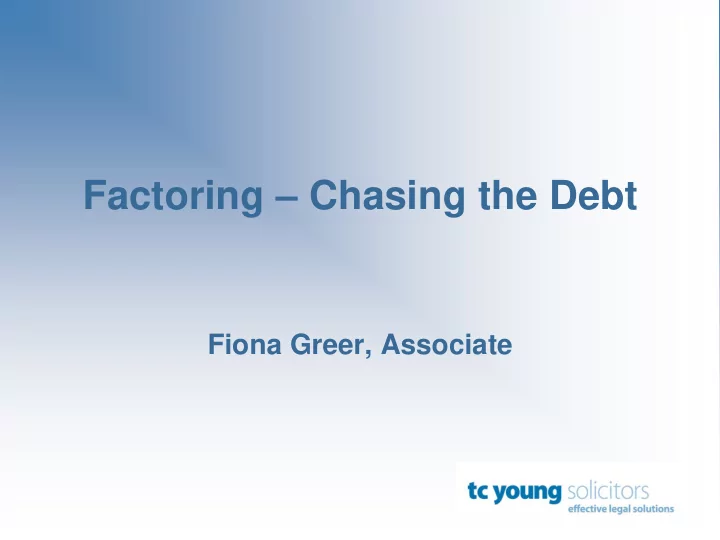

Factoring – Chasing the Debt Fiona Greer, Associate
Recovery Can you pursue the debt? - Element of prescription - Any debt over five years old will have expired
How do I recover the debt? • Notice of Potential Liability • Seven day final demand letter • Court action
Notice of Potential Liability - Tenements (Scotland) Act 2004 - If owner sells NPLC will flag up outstanding debt to potential purchaser - Buyer assumes liability for debt if not cleared - Valid for 3 years then re register - Registration fee £60 - Pre-Court option
Seven Day Final Demand • Letter to owner requesting payment failing which court action • Court will want to see steps have been taken to resolve matter without involving them! • Could have an effect on any eventual award of expenses • Recorded delivery or Sheriff Officers (not a requirement)
Court Action – Type of Action? Sheriff Court Procedure: How much is the debt outstanding? < £3000 - SMALL CLAIM < £5000 - SUMMARY CAUSE > £5000 - ORDINARY CAUSE
Court Action – Owner’s Response Possible responses from the owner…. 1. Does nothing 2. Admits the claim and settles the case 3. Admits the claim and makes a written application about payment (instalment proposal) 4. Admits the claim and attends court to make an application about payment 5. Disputes the claim and attends court for a fight!
Decree Granted – Whats Next? 1. Charge for Payment 2. Earnings arrestment 3. Inhibition 4. Arrestment 5. Attachment 6. Sequestration
Charge for Payment • Formal written demand for payment • Give period of 14 days to pay debt • Charge will list debt, interest, court expenses and sheriff officers expenses
Charge for Payment • First step of diligence and must be served prior to an earnings arrestment, arrestment or attachment • Lets debtor know serious implications of the debt as they will be visited personally by Sheriff Officer • Allows officer to investigate potential recovery prospects
Arrestment • Freezing of funds in the hand of a 3 rd party, quite often a bank, or a tenant! • Usually speculative • Can be carried out quickly (although a charge for payment must be served first)
Bank Arrestment • Can prompt debtor into quick arrangement • Banks have duty of disclosure • Debtor has to release sums arrested within period of 14 weeks • Can only arrest funds in excess of £460.06
Earnings Arrestment • Compels employer to deduct a set amount of money from a debtors net salary or wage on each pay day based on table of deductions • Protected Minimum Balance • Payments can be made directly to creditor • Continues until debt is paid or the debtor leaves employment • Only one earnings arrestment can be in force at any given time, although an application can be made by way of a conjoined arrestment for a share of the deductions between two or more creditors
Inhibition • A preventative diligence that stops the sale or completion of sale of heritable property. • Previously only available through the Court of Session; can now obtain authority to inhibit through a Sheriff Court decree • Lasts for 5 years • “Arm twisting” diligence – debtor cannot sell property whilst the inhibition exists • Not a quick fix though
Attachment • Previously only available in domestic situation outside of persons residence, ie. a car in driveway or goods in a garage or outhouse. • Does not cover goods subject to hire purchase or rental agreements • Most household goods are protected. • Attached goods valued at second hand goods sale room value
Money Attachment • Could be useful when pursuing commercial owners but doesn’t apply to residential premises • Sheriff Officers can turn up unannounced to premises and attach cash, followed up with a report to Court • Creditor then applies to court for money to be released
Sequestration • Is bankruptcy still a threat? • Worth it if person has assets – if not, it may be a welcome get out clause • Court proceedings have to be raised by solicitor – either debtor or creditor can apply
Sequestration • Court hearing is fixed and debtor requires to attend or be represented • Trustee is appointed by court to administer the debtors estate on behalf of all creditors • Debt has to be over £3000 • Automatic discharge of debtor after 1 year (can be extended)
Debtor Protection Other forms of protection available to debtor which may restrict your right to pursue debt:- • Debt Arrangement Scheme • Protected Trust Deed
Any questions? Fiona Greer Email: fjg@tcyoung.co.uk Tel : 0131 220 8746
Recommend
More recommend